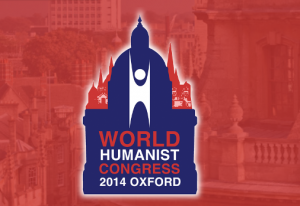No Child is Born to Hate: Educating the World in Humanism

Sonja Eggerickx is the president of the International Humanist and Ethical Union (IHEU), the international body of humanist organizations around the world. This speech was delivered on August 7, 2014 before the General Assembly of the IHEU.
When Andrew [Copson, executive director of the British Humanist Association] thought Oxford was a good place to have an International Humanist and Ethical Union General Assembly [the annual board of directors meeting of the IHEU] and the 2014 World Humanist Congress, I was enthusiastic—and afraid.
Enthusiastic goes without explaining: tradition of scientific research, high intellectual standards, nice town—the best there is to dream of for a Humanist Congress.
Although, at the same time, I was afraid! Inspector Morse, whom we all know, had to solve eighty-one murders in thirteen years as chief inspector. Eighty-one murders is enough to be not that enthusiastic about the venue. And it wasn’t just Oxford, quite a lot of them just happened in and around the university. However, it is necessary for humanists to separate fact from fiction, rational thinking from leisure. So here we are, feeling safe and happy as humans can be.
But for many, not that safe, and not that happy. Human rights are violated every day, there are wars going on all over the world, while at the same time there are remembrance ceremonies commemorating the beginning of the Great War. Coming from “little brave Belgium,” I watch a lot of documentaries, discussions, films on that war. I read about and watched the atrocities of Ukraine, Gaza, and Syria. There is not a lot to be happy about. Not that people don’t care—discussions on Internet forums are numerous and seldom balanced. Nationalism is winning everywhere: “We” and “they,” or rather “we” against “them,” dominates the discussions—no more nuanced debates. Criticizing Israel’s actions in Gaza makes you a friend of Hamas. Criticizing Hamas makes you a supporter of Israel’s politics. When you try to understand, you are seen as naive. And here we are: Humanists, convinced that using rational arguments is what will win in the end, yet at the same time looking carefully for words in order not to disturb or offend anyone who has a different idea. Nationalism doesn’t lead to anything good; history has proven this more than enough.
Will we ever learn from history? Just go back 100 years, look at the photos, watch the original images, filmed with primitive material and compare with what we see nowadays in the news. We conduct ceremonies and pay respect to those who fought for us, who gave their lives for our freedom, our liberty—not to forget the thousands of civilians, children included, whose names are not written on the walls of big war memorials. Last June I was in Sarajevo where, in 1914, the Archduke of Austria was shot dead, sparking World War I. Later, from 1992 to 1996, the city suffered the longest siege of a city in the history of modern welfare—for 1,425 days the city was attacked by artillery, mortars, tanks, anti-aircraft guns, heavy machine-guns, multiple rocket launchers, rocket-launched aircraft bombs, and rifle snipers. I was in Srebrenica, where twenty years ago there was a massacre of Muslim men and boys. We all agree: it is terrible and shouldn’t happen again. But in reality, it does—again and again.
Normally I try not to be cynical. But dear friends, do you have the same feeling of complete powerlessness when you see all that evil? It is too easy to say that we can bring back every conflict to a difference between religions. It is not that simple. However, there is a lot all those wars and fighting do have in common: they are all based on the ideas of being right, of knowing best, of being better than the other. But there is a light of hope for all of us.
No child is born to hate; he or she is educated to hate. What an immense opportunity for us: educate children and youngsters in rational, not national, thinking; in tolerant, not arrogant behavior; in critical thinking, not in memorizing by heart without the possibility of discussion; in enjoying life, not putting them through misery in the first place.
I am happy to welcome you at the General Assembly 2014 here in Oxford, and the World Humanist Congress celebrating freedom of thought and expression. Although I know that it is difficult to choose one particular human right as the most important, I am convinced that, without freedom of thought, it’s impossible to stand up for all the other rights.
